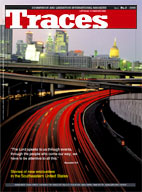
Traces N.4, April 2006
A New BirthApril, a year ago, John Paul II died. His figure and testimony moved the world deeply and changed the lives of many. Men of all kinds and cultures acknowledge how he served life with great hope. Passionate about man because he was passionate about Christ, he was an example of positive fertility in an era full of shadows, chilled by the closure of ideologies and new terrifying violence. He planted seeds and germinated new lives in earth that many considered “a wasteland.”
“April is the cruellest month.” Thus begins T.S. Eliot’s poem, a masterpiece of the 20th century significantly entitled, “The Wasteland.” With these words, the writer evoked a paradox: even in the season when nature prepares for fertility and spring, existence can be wrapped in a cruel sense of desolation. Nature is not enough to guarantee a full human life. In order for a man’s existence to generate, to positively create, he needs the consciousness of a purpose, a destiny. Everyone in our society has before them a dual worrisome phenomenon: the cessation of births and the incapacity to educate. A people that no longer has a clear meaning and destiny suffers exhaustion and no longer raises men capable of a relationship with reality charged with reason and affection.
Together with these, there are other factors that mark–this April–the difficulty of a confident openness to the future, a desire to invest in order to build for one’s children and tomorrow. There is a widespread sense of delusion, a tendency to whine, in this “age of anxiety,” to use the words of another great English poet, W.H. Auden. The invitation that nature extends to each person, to feel and reflect on the promise of life that vibrates in each creature, gives out too often in a brief feverish waste of energy. Thus, the imminent danger of nihilism looms over everyone, over us Christians as well, when we reduce our faith to a set of notions or an abstract ethics that has nothing to do with daily life.
In contrast, even the death of John Paul II, like that of Fr. Giussani shortly before, was a moment from which hopes and liberations flowered–as if to show, in the extreme, that underlying every great fertility or paternity there is also a sacrifice that, made for the love of destiny, is the way to the hundredfold here and now, the multiplication of a good.
April can be the cruellest month for a man who has lost the meaning and the destiny of his own days. Even the lights of nature, its sweetness, can become intolerable for a man closed in the prison of nothingness as his horizon and as the key to circumstances. He has to deny the beauty of spring, or the beauty of a human testimony. Thus we see–guided by Benedict XVI–the Church still suffering persecution, with a growing number of martyrs in the world, and the derision of the sitting rooms or newspapers of those who give the hope of men only bored cursory glances. But the witness of the popes and of many Christians repeats the challenge of every April to men of all kinds. What are we growing? What land will we leave, a wasteland or one more humanly cultivated?
The untiring insistence of the Pope illuminates the daily battle against nothingness: “The Christian faith is not an ideology, but the personal encounter with Christ crucified and resurrected. From this experience, that is individual and communitarian, flows a new way of thinking and acting.”